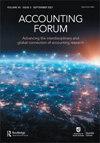“令人不安的领域”:税务行业的个人和组织价值观
IF 3.4
4区 管理学
Q2 BUSINESS, FINANCE
引用次数: 2
摘要
作为专业人士,会计师持有部分基于道德要求的公共利益使命。然而,个别专业人士,特别是税务专业人士,通常认为他们的工作更多是技术性的,而不是与公共利益有关。公众对避税的关注日益增加,这使人们关注如何将道德价值观运用到税务工作中。在这些背景下,个人价值观和组织价值观之间的紧张关系值得关注。本研究采用了一项大型国际调查和一组68个半结构化访谈,以探讨个人为其税务工作带来的个人道德或精神价值观与组织道德框架之间的平衡。这种直接的方法抓住了个人税务专业人员水平上的自我报告的道德意识,并将道德意识概念作为道德行为的基础水平(Rest, J.,《道德发展:研究和理论的进展》)。普雷格,1986)。我们发现,除其他外,精神价值观被理解为个人价值观,在规模较小的国内公司和仍在进行专业考试的公司中最具影响力,而在大型国际公司的早期职业专业人员中,道德意识最低。该研究强调了在职业培训期间获得的道德学习与在职业生涯早期阶段的应用之间的脱节。公司内部的社交活动增加了早期职业生涯阶段为整个职业生涯的道德框架奠定基调的潜力。这就加强了公司和专业机构对道德判断进行评估的责任。本文章由计算机程序翻译,如有差异,请以英文原文为准。
“Uncomfortable territory”: personal and organisational values in the tax profession
ABSTRACT As professionals, accountants hold a public interest mandate based in part on ethical claims. However, individual professionals, particularly in tax, commonly see their work as more technical than relating to the common good. Rising public concern about tax avoidance focuses attention on how ethical values are brought to bear on tax work. In these contexts, the tension between personal and organisational values merits attention. This study draws on a large international survey and a set of 68 semi-structured interviews to explore the balance between the personal ethical or spiritual values that individuals bring to their tax work and the ethical framing of their organisations. This direct approach captures self-reported moral awareness experienced at the level of the individual tax professional, framed by the concept of ethical awareness as a base level of ethical action (Rest, J., Moral development: Advances in research and theory. Praeger, 1986). We find, inter alia, that spiritual values are understood as personal and are most influential in smaller, more domestic firms and among those still undertaking professional exams, while ethical awareness is lowest among early career professionals in large international firms. The study highlights a disconnect between ethical learning acquired during professional training and its application at the early career stage. Socialisation within the firm adds to the potential for the early-career stage to set the tone for career-long ethical framing. This heightens the responsibility of firms as well as professional bodies to valorise moral judgement.
求助全文
通过发布文献求助,成功后即可免费获取论文全文。
去求助
来源期刊

Accounting Forum
BUSINESS, FINANCE-
CiteScore
5.20
自引率
6.50%
发文量
0
期刊介绍:
Accounting Forum publishes authoritative yet accessible articles which advance our knowledge of theory and practice in all areas of accounting, business finance and related subjects. The journal both promotes greater understanding of the role of business in the global environment, and provides a forum for the intellectual exchange of academic research in business fields, particularly in the accounting profession. Covering a range of topical issues in accounting, business finance and related fields, Accounting Forum''s main areas of interest are: accounting theory; auditing; financial accounting; finance and accounting education; management accounting; small business; social and environmental accounting; and taxation. Of equal interest to practitioners, academics, and students, each issue of the journal includes peer-reviewed articles, notes and comments section.
 求助内容:
求助内容: 应助结果提醒方式:
应助结果提醒方式:


